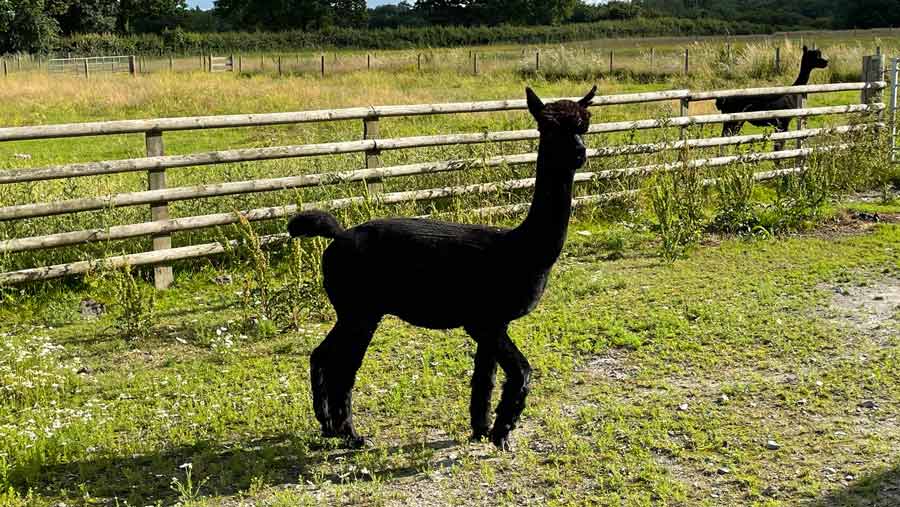Farmers and vets hope alpaca case raises bovine TB awareness
 © Helen MacDonald
© Helen MacDonald Farmers and vets hope the high-profile case of Geronimo the alpaca will help raise public awareness of the devastating financial and emotional impact of bovine TB on the industry.
Government vets have 28 days from Thursday (5 August) to euthanise Geronimo after his owner, farmer and alpaca breeder Helen Macdonald, lost a legal battle.
The High Court in London ruled last week that the alpaca must be put down to protect cattle from bovine TB.
See also: Farmer in bovine TB fight with Defra to save alpaca
The case has sparked a national conversation about the reliability of the bovine TB testing regime and the slaughter each year of thousands of animals due to the disease, which Defra says costs taxpayers more than £100m annually.
The latest government statistics show that, in the 12 months to the end of March this year, 38,841 cattle were slaughtered in Great Britain because of bovine TB.
Livestock farmers and vets say they have huge sympathy for the plight of Ms Macdonald, but say her case is just the tip of the iceberg compared to the suffering caused by the disease on a daily basis.
Farmer TB devastation
Derbyshire-based farm vet Sarah Tomlinson, a bovine TB expert who sits on Defra’s Bovine TB partnership, said: “The emotion that this lady [Helen Macdonald] is going through is what my farmers go through every time they have reactors that go.
“I have been sat in farmers’ kitchens in tears because cows are going to be culled. I remember one terrible case of a farmer whose daughter had reared a calf since it was a baby and it had to go because it was a reactor.
“This public platform should be used by the farming industry to raise awareness of how devastating this disease is.”
Mrs Tomlinson said many cattle are culled having tested positive for bovine TB despite looking “fit and healthy” and showing no signs of the disease.
Cheshire dairy farmer and Nuffield scholar Phil Latham, who milks about 500 Brown Swiss pedigree cows near Nantwich, Cheshire, said the alpaca had failed two Enferplex (blood) tests – a government-approved voluntary TB test for camelids which is supported by the British Alpaca Society.
“The animal could have gone. It should have gone a long time ago. It’s a disgrace that it didn’t,” said Mr Latham.
“It highlights the lack of integration in the system. We either have a system, or we don’t. It is impossible – as we know – to reduce TB with a cattle-only approach.”
‘Emotive nonsense’
Mr Latham said farmers never receive the same level of indulgence from Defra and the mainstream media when their animals test positive for bovine TB.
“All my cows have names. I do not see anybody saving Bluebell,” he added. “It is just emotive nonsense for people who are uninformed about disease.”
Mr Latham said he was concerned by a report in the Telegraph that wildlife campaigner Dominic Dyer planned to ask the prime minister’s wife, Carrie Symonds, to personally intervene in the case to save the alpaca’s life.
“This suggests that there is an open channel to an abuse of power,” said Mr Latham. “What Carrie Symonds says should have no bearing whatsoever on this case.”
The prime minister’s father, Stanley Johnson, has joined the campaign to save Geronimo. He told the Sun newspaper that the alpaca should be tested again and his life should be saved.
Business secretary Kwasi Kwarteng told radio station LBC: “Defra had their tests. The animal, Geronimo, was found positive and according to the policy, animals that are found positive have to be culled.
“If it is the case that Geronimo has tested positive for TB, then I think the cull should happen.”
‘False positives’ claim
Ms Macdonald, who farms at Wickar, south Gloucestershire, insists that results of the tests were “false positives” because of multiple priming of tuberculin – an inactivated strain of Mycobacterium bovis which is used in skin tests to detect bovine TB – over many years.
Writing in the Mail on Sunday, Defra secretary George Eustice said he investigated this assertion, but discounted the theory as the Enferplex test detects the protein of bTB itself, not an immune response.
“Geronimo tested positive twice using the Enferplex test. It is the test that was requested by the British Alpaca Society at the time. When it comes to positive test results, it is over 99% accurate with a ‘false positive’ in only 0.34% of cases,” wrote Mr Eustice.
Animal rights protestors are due to demonstrate in London on Monday afternoon (9 August) in a bid to save the animal.
